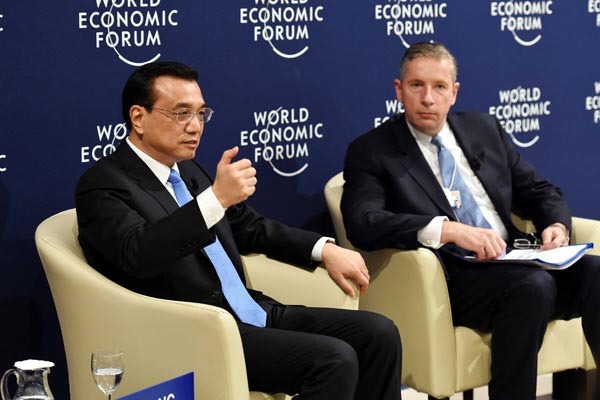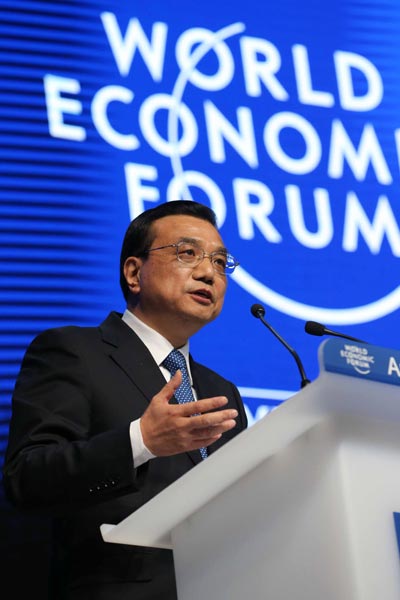
Premier Li Keqiang attends the International Business Council of the World Economic Forum in Davos, Switzerland, on Jan 21.[Photo/Xinhua]
Full text of Premier’s keynote speech at the World Economic Forum
Global business leaders and analysts comment on Premier Li Keqiang’s keynote speech at the World Economic Forum annual meeting on Jan 21.
Peter Maurer, president of the International Committee of the Red Cross
It resonates a lot when the Chinese premier mentions how important the (global) environment is for growing and sustainable economy. It’s something which we relate a lot with the Chinese authority, and we had excellent cooperation with China on that message, so I think it’s very encouraging.
The second thing I extremely appreciate is the tone of realism, and sort of like Eurasianist statement, in his speech. It came to me as a strong message that we know who we are, where we are, where we will go, maybe there will be some difficulties. So he didn’t make a promise to the world which cannot be fulfilled. But it seems to me he is not under-ambitious either. So he has a vision, but it’s a realistic vision.

Premier Li Keqiang delivers a keynote speech at the World Economic Forum (WEF) annual meeting in Davos, Switzerland, on Jan 21.[Photo/Xinhua]
Nariman Behravesh, chief economist of IHS, a consulting firm based in Switzerland
Premier Li clearly is a trained economist and he spoke in a way that I think really reached out to this audience. They want to know some specifics, for example, what are China’s goals, how it’s gong to get there. He raised a number of issues. He talked about integration, free trade and sustainable growth rate, very important for this audience. He talked about China willing to trade off a little bit of growth for the focus on reforms, again very important.
He spoke with energy, with passion. I think it’s important for Premier to talk about geopolitics and terrorism at the very beginning. These are crucial aspects that these delegates are worried about. They worry about economy but unfortunately the two issues are intruding as they were so we have to deal with them. So I think it’s right for him to focus on that first.
Karel Lannoo, executive director of Brussels-based think tank Centre for European Policy Studies
China’s role is very important, for Europe, the US and the rest of the world. My confidence would be based on the fact that in the past 20 years, China has managed it well, and it has the necessary buffers to stimulate the economy.
Flemming Christiansen, professor and chair of political sociology at University of Duisburg-Essen in Germany
I have followed China’s development as a keen observer since it started in 1978, and I think Premier Li is right to say that the initial rural reforms (1978-1983) represented a first example of what is still at the center of the efforts to develop China’s political economy: unleashing the force of mass entrepreneurship and innovation using what he calls the “laws of the economy” and maintaining a firm guiding and facilitating role of the government.
David Fouquet, senior associate at European Institute of Asia Studies in Brussels
The world is wondering if China can remain the engine of growth if it slows down. To my mind there is still considerable growth potential, but it also depends on how the markets respond and whether China continues to import and invest outward.
Nicolas Musy, managing director of the nonprofit organization Swiss Center Shanghai
China will remain a fundamental engine of world growth. If the US grows 3% in 2015, it may retake its traditional locomotive position and add as much GDP as China (due to its bigger economic size). Still, China is essential to the world at a time when Europe, Japan and Russia are not growing, or very little.
I am quite confident that the recipe of Premier Li’s is the right one: Innovation will allow high quality growth. Facilitating the emergence of innovating companies like Xiao Mi (taking market share from Apple or Samsung) will be critical for China to continue growing fast.
Bart Dessein, professor at Ghent University in Belgium
Premier Li made an overall reassuring speech on two aspects: China’s national and China’s international dimension.
For the foreseeable future, the growth path will not change from this ‘new normal’. Focus will be on reforms that unleash the creativity of the people and will, overall, make sure that the well-being of the Chinese people will increase.
Such a new qualitative growth path needs international collaboration. In this respect, Premier Li mentioned that the internationalization of the RMB is only a natural and necessary process, as the importance of China as international trade partner is growing.
Precisely because economic growth is only possible in a peaceful international context, China’s growth will not lead to China looking to change the world order. History has taught that only peaceful development brings prosperity. Therefore, also mutual understanding, peaceful coexistence and international harmony are needed.
